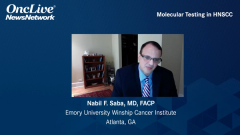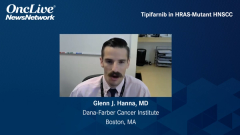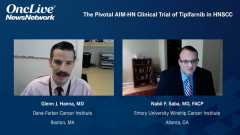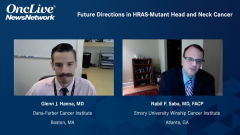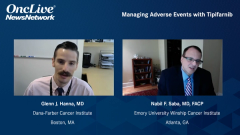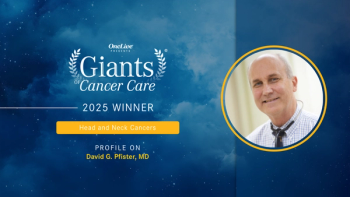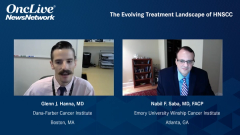
Managing Adverse Events With Tipifarnib
Recommendations for mitigating and managing treatment-related adverse events associated with tipifarnib.
Glenn J. Hanna, MD: I think the only other thing on our agenda was the tolerability and safety. You can certainly comment. I’ve treated a number of patients with salivary gland cancer just because I see a fair volume, and patients with head and neck cancer, and overall compared to our other armamentarium, tipifarnib is generally well tolerated. It is an oral option. The schedule is a week on and a week off, 2 weeks on in the totality of a month, 1 on, 1 off. And patients generally feel pretty well. I did mention I’ve noticed some cytopenias, but often those are manageable. If you hold the dose or adjust the dose, it’s something that can be handled. In addition, the only event that’s a bit unique to the agent is the acute kidney injury, which is an increase in creatinine and subsequent BUN [blood urea nitrogen], but again, if you hold the drug, often hydrate the patient, it seems to settle, and then you dose adjust. Those are the dose-limiting issues I’ve run into. I would say on the whole though, people feel quite well on the drug and are often living and working, and it’s well tolerated. I don’t know what your experience has been.
Nabil F. Saba, MD, FACP: Yes, identical Glenn, to your experience. It’s exactly what you described, and I agree with what you said.
Glenn J. Hanna, MD: It seems like we’ve covered a fair amount. We’ve talked about some exciting opportunities or agents in the head and neck landscape in terms of targeted or molecular therapies, where things stand in the recurrent metastatic setting. We spent a lot of time on how we test and what platforms we use for testing, whether they’re commercial or in-house. I think we agree that as long as you’re testing, that’s probably the most important thing, particularly in the recurrent metastatic setting. We mentioned tipifarnib’s mechanism, the rationale and the rate of HRAS mutations in head and neck squamous cell cancers.
Then we summarized the tipifarnib data to date based on the initial trial, which got us to the correct dose and identified a squamous population of interest. Now we’re dealing with the pivotal study, which as you said, is an international effort that’s enrolling patients with HRAS mutations regardless of variant allele frequency and has a matched cohort of wild-type patients to compare. Hopefully those results will be compelling and may lead to an indication for this drug in this population. I think that would be potentially the first targeted therapy, true traditional targeted therapy, for head and neck cancer, at least for a small molecule oral inhibitor in the recurrent metastatic setting. So we’re following right behind our lung cancer colleagues.
Nabil F. Saba, MD, FACP: Yes. I’m not sure it is right behind them, but I think following them, certainly.
Glenn J. Hanna, MD: Lagging behind.
Nabil F. Saba, MD, FACP: It is a series of steps. This has been a great discussion. I think we’ve hit the main points, I agree, Glenn. I really look forward a few years from now to reviewing the results of this accruing trial and having a new indication in recurrent metastatic patients. It would be the first really targeted agent, as you have rightfully indicated, and so I’m looking forward to an exciting future. It was a pleasure discussing this with you, and I look forward to more discussions.
Glenn J. Hanna, MD: Yes. Take care. It’s always great to see you, Nabil.
Nabil F. Saba, MD, FACP: Thank you. Take care as well.
Transcript Edited for Clarity


